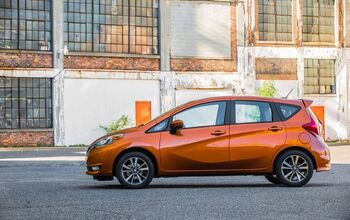Nissan Considers Bringing Its Unusual E-Power Technology to America

The success of Nissan’s e-Power system in the Japanese-market Note hatchback has company brass considering a trans-Pacific trip for the technology.
Should it arrive stateside, e-Power stands to give Nissan an edge in low-priced electrification — potentially undercutting the price of compact hybrid rivals by thousands. Unlike conventional hybrids and plug-in models, Nissan’s system burns gasoline every moment of the drive, despite an electric motor doing all the pulling work.
The novel approach is similar to the Chevrolet Volt’s powertrain, minus the larger battery and plug-in capability. There’s no option of all-electric driving with this system. Instead, a 1.2-liter three-cylinder turns at an optimized 2,500 rpm to generate electricity for the electric motor, feeding a steady slow of it into a compact battery located under the front seats.
Shrinking the battery means lower production costs and a friendlier MSRP. In Japan, a Note (Versa Note in the U.S.) with e-Power retails for about $19,000.
“It is a technology that clearly can fit outside Japan in all the key markets,” Daniele Schillaci, Nissan’s executive vice president of global marketing and sales, told Automotive News at last month’s Shanghai auto show. “We are thinking about moving forward faster on electrification, not only in pure EVs, but also in this e-Power technology.”
The technology first went on sale in Japan last November. Already, the Note e-Power has overtaken the Toyota Prius in sales, providing motivation for the automaker to seek out new markets. While a U.S. introduction isn’t a sure bet, Nissan surely sees it as fertile ground. Not only would the unconventional hybrid battle the Prius, it also has the new Hyundai Ioniq Hybrid to contend with.
“When a technology is successful, it is natural for us to seek something a bit wider,” said Schillaci.
The Note e-Power doesn’t quite reach the lofty fuel economy figures of rival hybrids, though it does offer greatly improved mileage at a lower starting price. Considering the Versa’s U.S. sales remain in the six-figure range, fielding a less-expensive hybrid version with punchier power delivery — Nissan rates the Note e-Power at 187 lb-ft of torque — could prove worthwhile.
[Images: Nissan]

More by Steph Willems
Latest Car Reviews
Read moreLatest Product Reviews
Read moreRecent Comments
- Rrp138519787 If Jeep wanted to re-introduce the Wagoneer name, they just should have named the Grand Cherokee L the Wagoneer instead, and done a little bit more styling differentiation. They could have done a super deluxe version as the Grand Wagoneer. But all Wagoneers would have been the three row version as the primary product differentiation. And would cause less confusion for consumers overall.
- D The only people who have TDS, which I assume is Trump Derangement Syndrome, are the MAGOTS who have been brainwashed to love him. They Know Not What They Do.
- The Oracle The updated Model Y beat this copy to market.
- ToolGuy™ I respect what the seller is doing, but this vehicle is not for me. (Seller doesn't care, has two people lined up already.)
- SCE to AUX How well does the rear camera work in the rain and snow?



































Comments
Join the conversation
A 1.2 3-cylinder engine running constantly at 2500 RPM is probably going to produce around 40 HP (max, probably less). It will NOT be a quiet companion. The only advantage is that it will warm up and stay at a steady temperature.
Prius is a technological marvel beautifully executed by Toyota. Reliable, fairly economical with high bling factor. But from the practical point of view Prius' hybrid drive is too complex and expensive. This system from Nissan is everyman's "hybrid". Expect these to sell for about $16000 in the US. This will be successful.